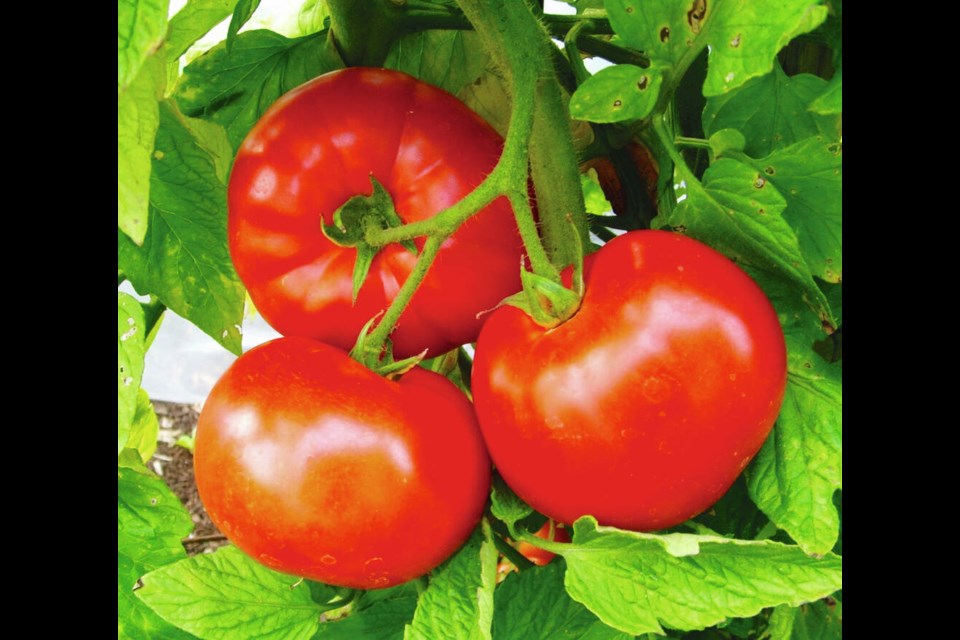Dear Helen: Have you found a way of dealing with fruit flies? Clouds of them gather around the fruit I’ve been processing this month.
F.L.
Dealing with the fruit as speedily as possible is most helpful. Covering waiting fruit with multiple layers of newspaper has worked for me too.
Fruit flies gather in the container I keep beside the kitchen sink for fruit and vegetable peels to be dug into the garden later. To deter them, I’ve been experimenting with drops of tea tree oil on a “lid” of folded newspaper. It works, and the newspaper cover is easily lifted for frequent additions to the container as I deal with fruits and vegetables.
This has been effective, but the tea tree needs to be re-applied every few days. Not everyone will tolerate the strong medicinal smell of the oil. I like the clean, antiseptic scent.
Traps are usually made with fruit “bait” in closed containers (sour cream, for example) with small holes punched into them under the rim. I’ve found they don’t significantly reduce fruit fly numbers.
Dear Helen: One of our tomato plants has produced fruits with seriously distorted shapes. Is this preventable?
N.C.
Providing the best growing conditions possible is all that can be done to prevent misshapen tomatoes. The problem is caused mainly by the weather. Temperature extremes, a wide difference between day and night temperatures, and heat high enough to partially sterilize the tomato flowers’ pollen are the usual causes. This summer’s weather has been a particular challenge.
Of significant importance to home gardeners now is to note carefully the varieties that have been the most problem free despite the difficult summer weather conditions. Plan to continue growing these resilient varieties and consider discarding ones that did not grow or/and produce well.
Recent information updates from seed companies indicate that growers and breeders have been making similar assessments. It is common for seed company owners and representatives to visit trial grounds across the continent to see what new and upcoming vegetable and flower varieties are most promising.
This year, they have also been noting carefully in trial plantings the varieties that have proven to be outstanding for their resistance to weather extremes.
Dear Helen: I help out in the garden of a waterfront home. The owners always grow around 25 tomato plants, some cherry and some with regular sized round and beefsteak tomatoes. For the past two years, the cherry tomatoes continued to be fine, but as soon as the larger ones are ripe, they disappear overnight. This remained a mystery, until a visitor noticed movement in the tomato patch one day and saw a sea otter leaving the scene. Have you ever heard of such a thing, and is there some way to deter otters from taking the tomatoes? I thought they ate a variety of seafoods.
P.C.
They do eat seafood, but fruits, berries, and some vegetables that are easily accessible also appeal to them. Many are attracted to the scent of ripening tomatoes.
Sea otters, like raccoons, are intelligent creatures, hard to keep away from their preferred garden produce, especially when one of the animals has found a handy source.
The only possible solution I can think of is a barrier of some sort, perhaps sturdy netting draped over the plants and secured at the base. This would be fairly easy to do if the large-fruited tomato plants were trained against strong wire fencing.
Perhaps a reader of this column with the same problem has found a solution and will share it with us.
Plant sale. The Peninsula Garden Club will hold a Fall Plant Sale on Saturday, 10 a.m. to 12 p.m. in the Mary Winspear Centre parking lot in Sidney. Cash in small bills and change, and cheques, are welcome. Social distancing and masks are required.
HCP information. The Horticulture Centre of the 91ԭ��, 505 Quayle Rd. in Saanich, is open for the fall and winter from 9 a.m. to 4 p.m., Thursday through Sunday. Admission is free for HCP members. For others: adults (16 and over) $12, seniors (60 and over) and students $9. Memberships are available at the centre or online at hcp.ca. Visitors are welcome to bring a picnic, but without glass and alcohol.



